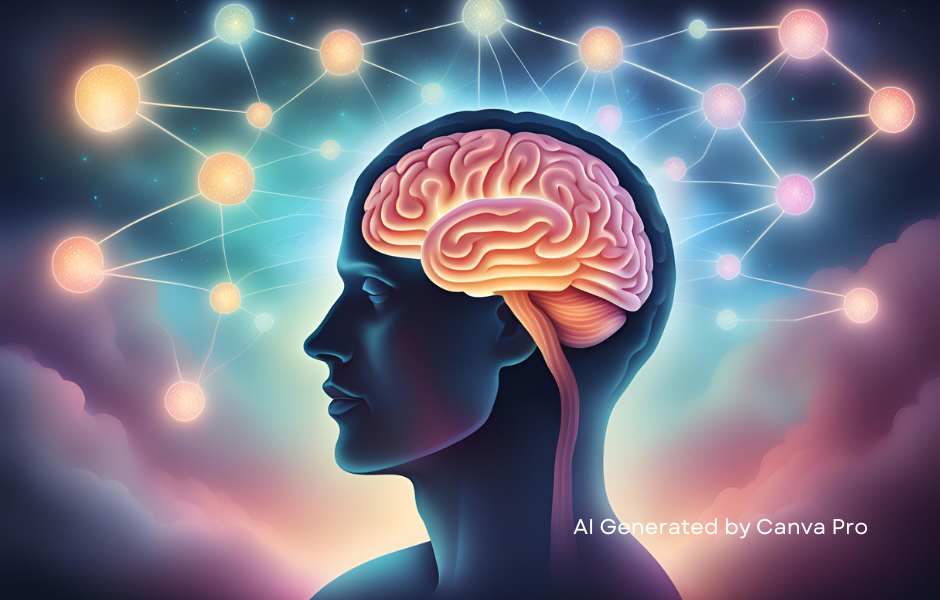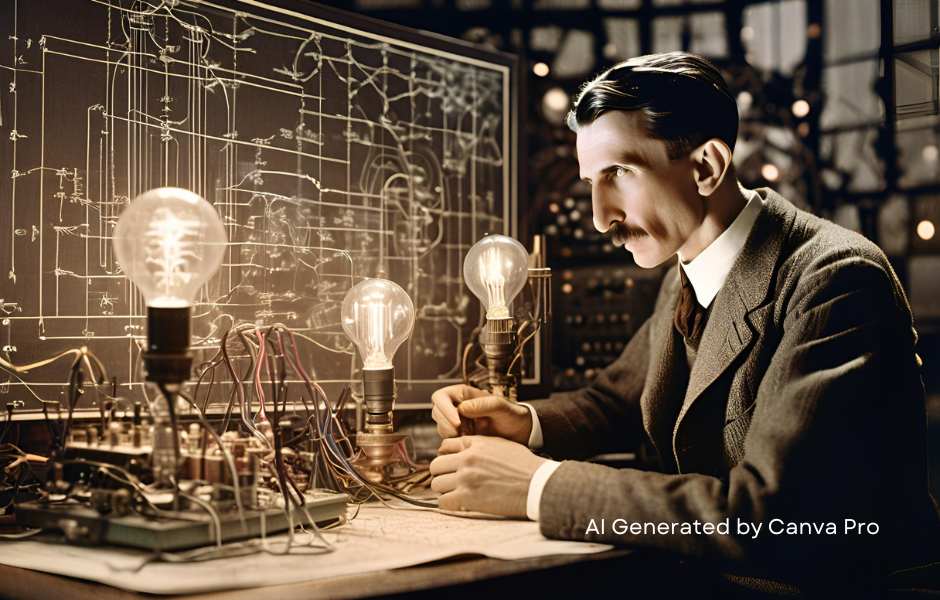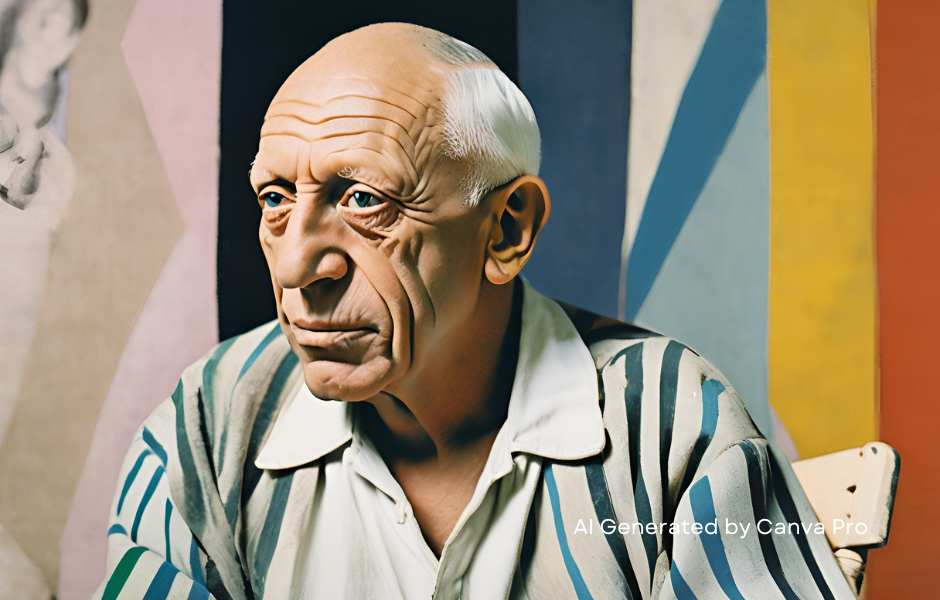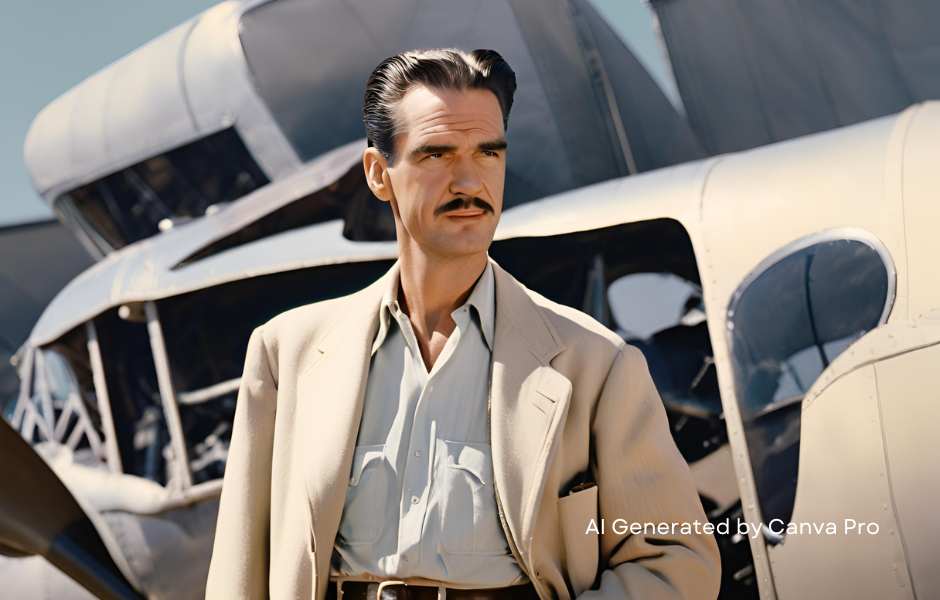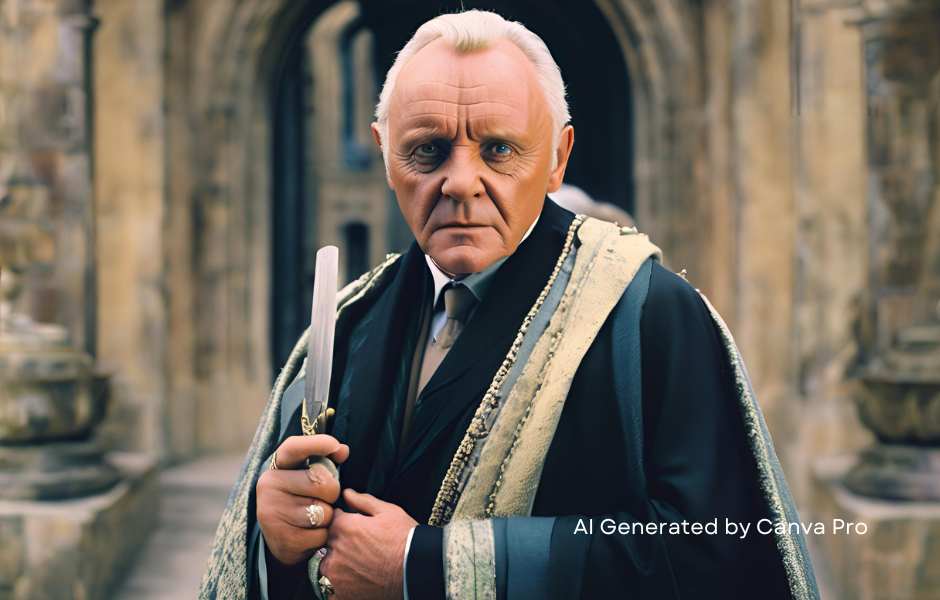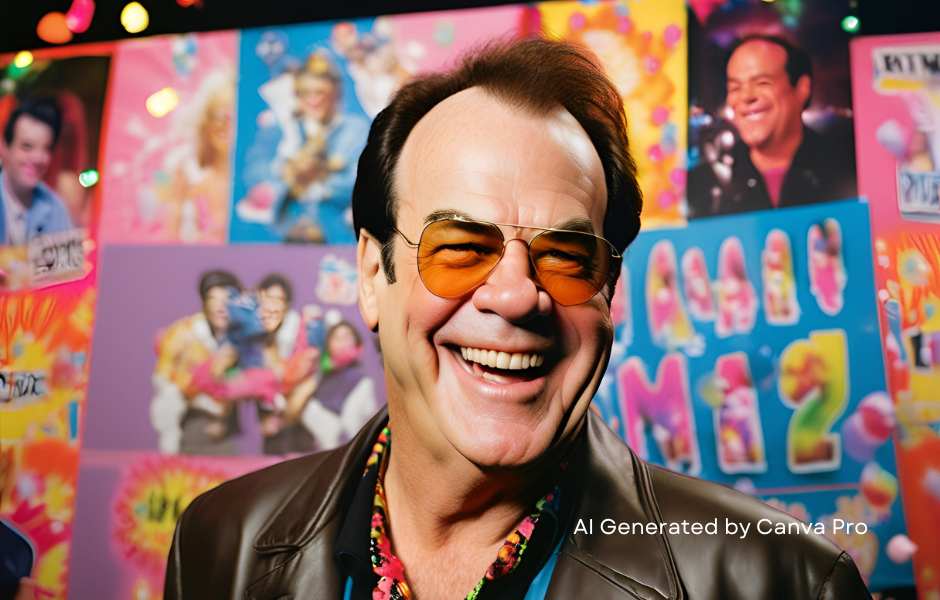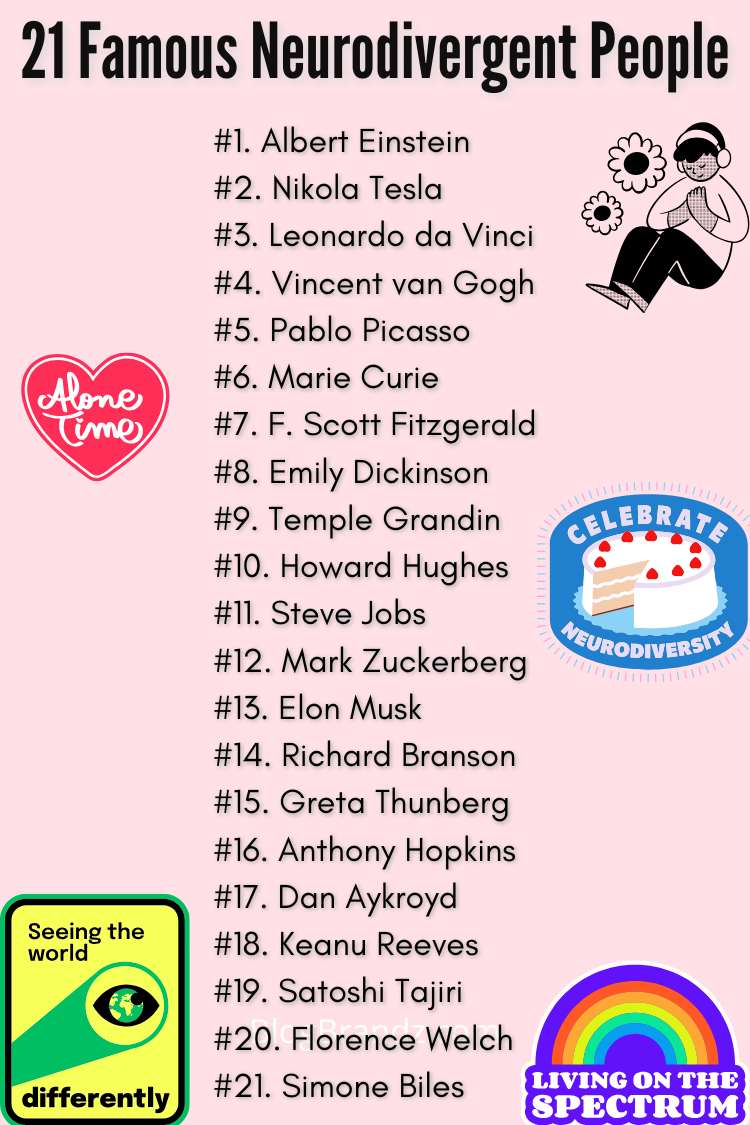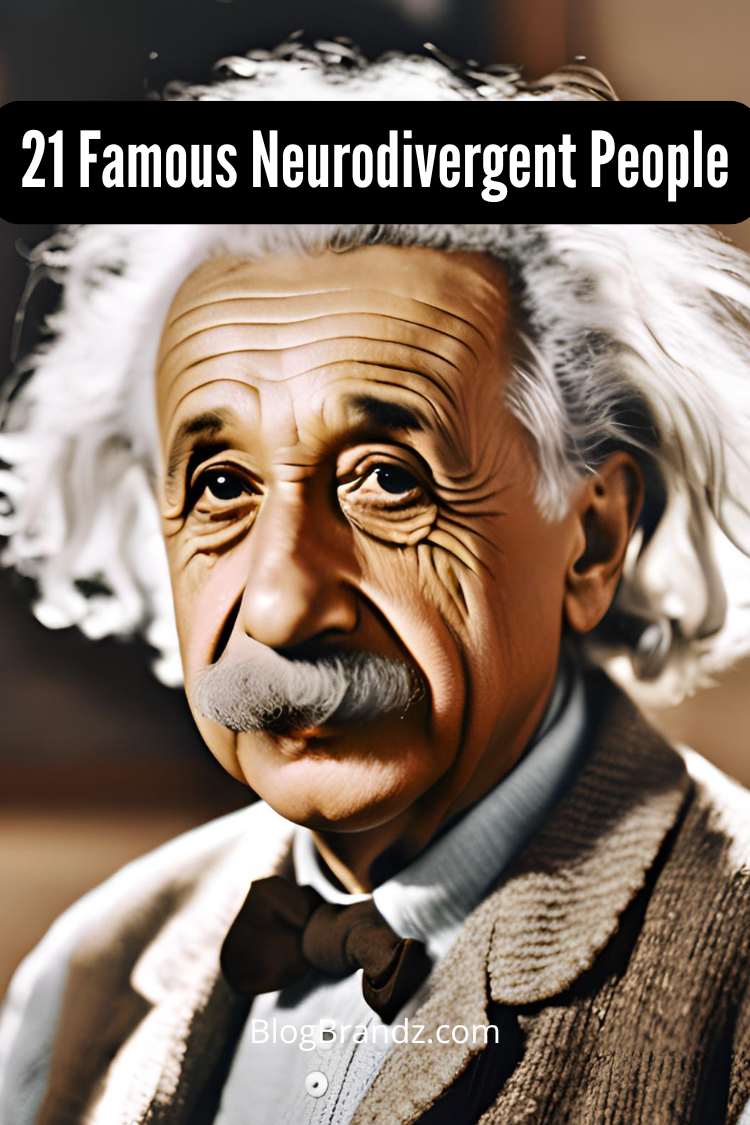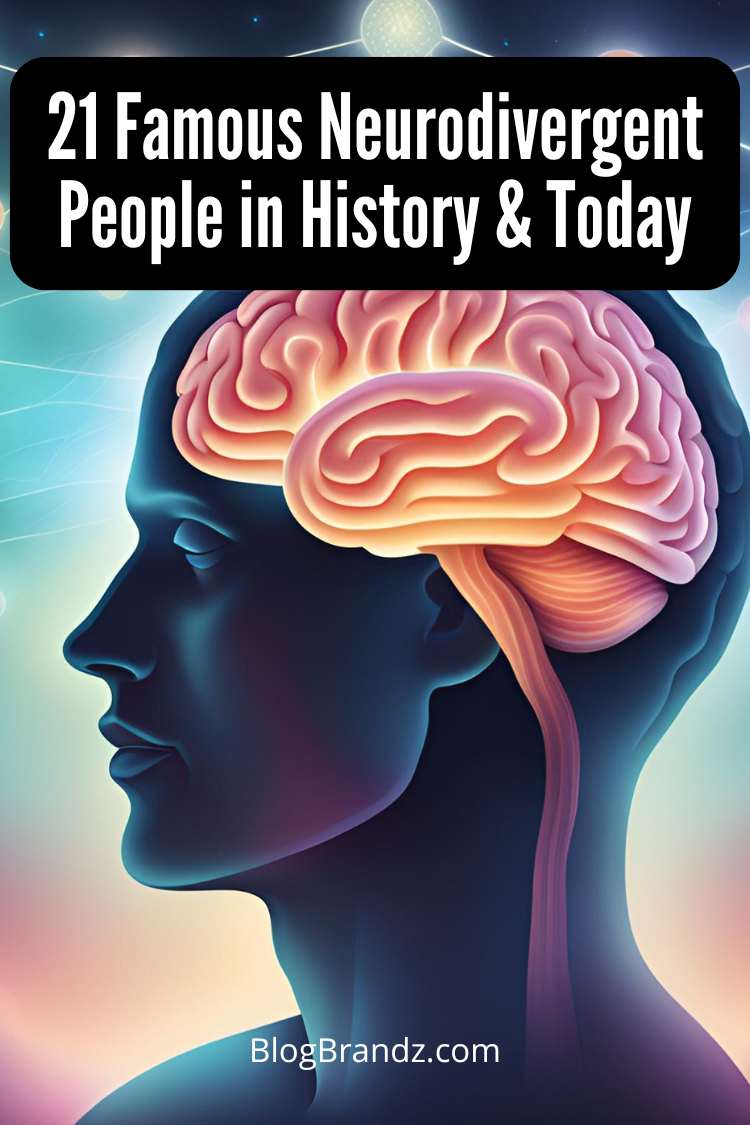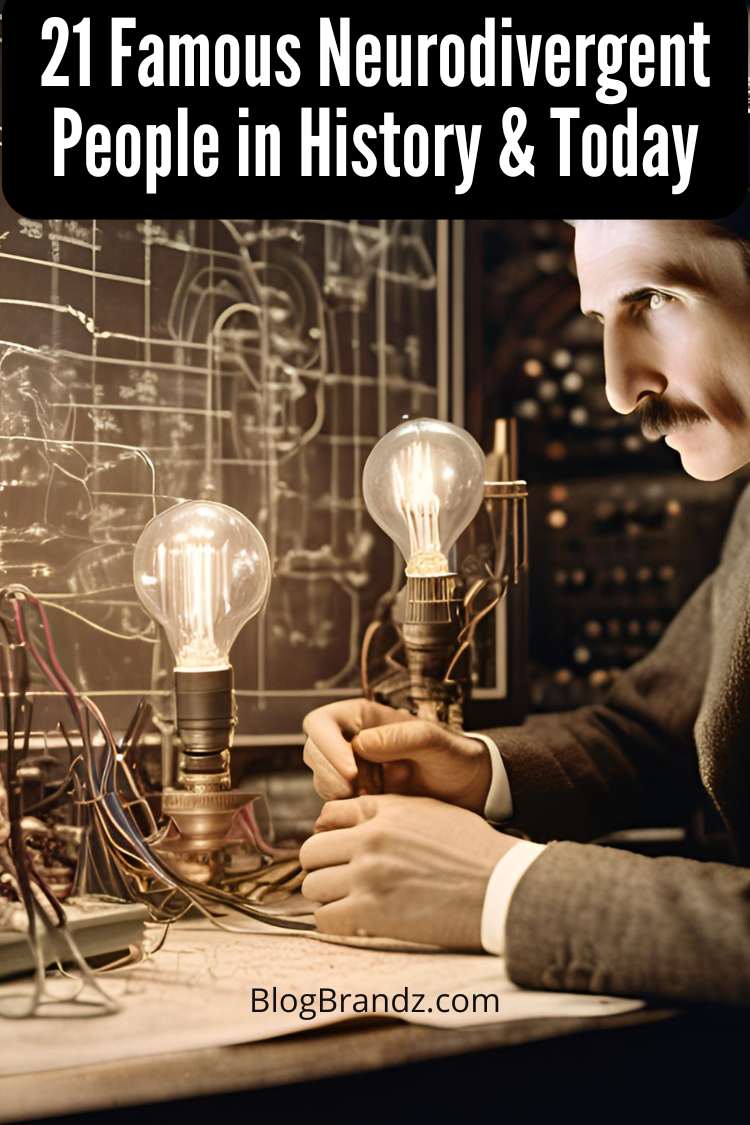Explore the inspiring stories of famous neurodivergent people in history and today who proved that differences drive success.
Throughout history, neurodivergent individuals have made groundbreaking contributions across fields, from science and technology to art and activism.
Many famous figures, past and present, have used their neurodivergent traits to fuel their creativity, resilience, and innovation, achieving remarkable success despite – or perhaps because of — their differences.
Contents
21 Famous Neurodivergent People in History & Today
Neurodivergence encompasses conditions such as autism, ADHD, dyslexia, and OCD, which shape unique ways of thinking and problem-solving. Here are 12 inspiring neurodivergent people who have impacted the world.
#1. Albert Einstein
Albert Einstein, one of history’s most famous physicists, is believed to have shown signs of autism or Asperger’s Syndrome due to his unique learning style and social habits.
His neurodivergence allowed him to think differently, approaching complex problems from angles others hadn’t considered.
Einstein’s intense focus and single-minded dedication to his theories played a significant role in his breakthroughs, especially in developing the Theory of Relativity.
#2. Nikola Tesla
Visionary inventor, Nikola Tesla, exhibited traits associated with Obsessive-Compulsive Disorder (OCD) and autism, impacting his focus, precision, and inventiveness.
Tesla’s meticulousness, which some attribute to his neurodivergent traits, was critical in his groundbreaking work with alternating current (AC) electricity.
His ability to visualize complex machinery in his mind — a technique known as “picture thinking” — allowed him to invent without sketches or prototypes, saving time and enhancing creativity.
#3. Leonardo da Vinci
Leonardo da Vinci, the Renaissance genius known for his art, science, and engineering, is often considered one of history’s earliest examples of a possible neurodivergent thinker.
While no formal diagnosis can be made, experts have speculated that da Vinci might have had traits consistent with ADHD or dyslexia due to his numerous, diverse interests and challenges in completing projects.
His neurodivergent traits may have contributed to his unparalleled creativity, allowing him to excel in art and science and pioneering insights centuries ahead of his time.
#4. Vincent van Gogh
Vincent van Gogh, the renowned Dutch painter behind masterpieces like Starry Night and Sunflowers, is often believed to have been neurodivergent, with researchers speculating he may have experienced conditions such as bipolar disorder, epilepsy, or autism spectrum disorder.
Van Gogh’s neurodivergence may have fueled his intense emotional connection to his work, driving the unique style and vibrant colors that characterize his art.
Although he struggled personally, van Gogh’s ability to channel his inner experiences into powerful, evocative paintings has left an indelible mark on the art world, making him one of history’s most influential artists.
#5. Pablo Picasso
Pablo Picasso, one of the most influential artists of the 20th century, is often thought to have exhibited neurodivergent traits, possibly related to dyslexia or autism spectrum disorder.
Known for his unique and constantly evolving style, Picasso’s ability to see the world from unconventional perspectives allowed him to break traditional boundaries in art, pioneering movements like Cubism.
His neurodivergent traits may have fueled his experimental approach, helping him create works that challenged norms and redefined visual representation. Picasso’s creativity and willingness to think outside the box continue to inspire artists around the world.
#6. Marie Curie
Marie Curie, the groundbreaking physicist and chemist known for her pioneering research on radioactivity, is often speculated to have exhibited neurodivergent traits.
Known for her intense focus, meticulous attention to detail, and unwavering dedication to her research, Curie broke barriers as the first woman to win a Nobel Prize — and the only person to win Nobel Prizes in two different scientific fields (Physics and Chemistry).
Her ability to think independently and relentless pursuit of knowledge helped her revolutionize our understanding of radioactivity, leaving a lasting legacy in science and medicine.
#7. F. Scott Fitzgerald
F. Scott Fitzgerald, the iconic author of The Great Gatsby and a leading figure of the Jazz Age, is often speculated to have been neurodivergent, possibly experiencing bipolar disorder.
Fitzgerald’s heightened emotional sensitivity and struggles with mental health influenced his writing, allowing him to capture complex characters and the intricacies of human relationships with extraordinary depth.
His neurodivergent traits may have fueled his unique insights into themes of aspiration, excess, and disillusionment, shaping his work and establishing him as one of America’s greatest literary voices.
#8. Emily Dickinson
Reclusive poet, Emily Dickinson, is often considered neurodivergent due to her unconventional social behavior and focus on the inner world, which might suggest autism or another form of neurodivergence.
Dickinson’s unique worldview and deep introspection fueled her poetry, allowing her to express emotions and ideas in ways that felt profound and revolutionary for her time.
Her reclusive nature gave her the quiet space needed for her creative expression, resulting in over 1,800 poems that have influenced generations.
#9. Temple Grandin
A leading voice for autism awareness, animal science professor, Temple Grandin, spoke openly about how her autism shaped her unique perspective in her work with animals.
Her neurodivergence gave her a heightened sensitivity to sensory input, which she used to better understand how animals perceive their surroundings.
This insight led her to develop humane livestock handling systems widely used today, transforming animal welfare in agriculture.
#10. Howard Hughes
Howard Hughes, the billionaire aviator, engineer, film producer, and business magnate, is often thought to have had obsessive-compulsive disorder (OCD). His OCD traits were evident in his meticulous attention to detail, strict routines, and, later, intense reclusiveness.
Despite these challenges, Hughes’s neurodivergence contributed to his relentless pursuit of perfection and innovation, especially in aviation, where he set multiple air speed records and developed groundbreaking aircraft designs.
Though his mental health struggles became more pronounced over time, Hughes’s visionary thinking and daring ambition left a lasting impact on the aviation and entertainment industries.
#11. Steve Jobs
Apple co-founder, Steve Jobs, reportedly showed traits of ADHD and autism, which may have influenced his intense focus and innovative approach to technology and design.
Jobs’ neurodivergence contributed to his obsession with perfection and user-centric design, which set Apple apart from its competitors.
His ability to focus intensely on product details and his bold, often unconventional ideas have helped shape modern consumer technology.
#12. Mark Zuckerberg
Mark Zuckerberg, co-founder and CEO of Facebook (now Meta), is often speculated to be neurodivergent, with some suggesting he may exhibit traits associated with autism spectrum disorder (ASD), though he has not confirmed this publicly.
Known for his intense focus, unique communication style, and analytical approach, Zuckerberg’s neurodivergent traits could have contributed to his visionary thinking in social media and technology.
His ability to think systematically and his commitment to innovation have driven Facebook’s growth from a college project to a global tech giant, transforming how people connect worldwide.
#13. Elon Musk
CEO of companies like Tesla and SpaceX, Elon Musk, publicly revealed he has Asperger’s Syndrome, highlighting how neurodiversity can contribute to innovative thinking in business and technology.
His intense focus on technology and willingness to take risks have fueled some of the most audacious projects of our time, from reusable rockets to electric vehicles.
Musk’s capacity for hyper-focus has allowed him to delve deeply into complex engineering challenges and develop disruptive solutions.
#14. Richard Branson
Richard Branson, founder of Virgin Group, has openly shared how his dyslexia shaped his entrepreneurial success. While traditional academics posed challenges, his condition fueled creative thinking and innovation, leading to customer-friendly ventures like Virgin Records and Virgin Atlantic.
Branson embraced dyslexia as a tool for innovation, focusing on team-building and collaboration to complement his strengths. This approach created a culture of creativity at Virgin and helped build a diverse business empire.
As a vocal advocate for dyslexia awareness, Branson encourages others to see their differences as strengths and pursue unconventional paths to success. His story proves that with determination and creativity, dyslexic individuals can achieve extraordinary accomplishments.
#15. Greta Thunberg
Greta Thunberg, an environmental activist with Asperger’s Syndrome, describes it as her “superpower,” fueling her focus and dedication to climate change activism.
Her neurodivergence has shaped her unique perspective on activism, allowing her to approach the climate crisis with an intensity and clarity that many others may overlook.
Thunberg’s Asperger’s Syndrome, which often leads to a heightened sense of justice and an intolerance for hypocrisy, drives her to challenge world leaders and demand real, meaningful change, making her a powerful voice in the fight against climate change.
Her ability to focus deeply on the issue, combined with her straightforward communication style, enables her to cut through distractions and stay focused on the urgent need for action.
#16. Sir Anthony Hopkins
Sir Anthony Hopkins, the Academy Award-winning actor known for his role as Hannibal Lecter in The Silence of the Lambs, was diagnosed with autism spectrum disorder (ASD) later in life.
Hopkins has described how his neurodivergence has shaped his personality and approach to acting, giving him an intense focus and a unique understanding of complex characters.
He credits his neurodivergence with helping him bring a heightened level of detail and depth to his performances, allowing him to captivate audiences with his nuanced portrayals and distinctive style.
#17. Dan Aykroyd
Actor and comedian, Dan Aykroyd, has shared that he has both Asperger’s Syndrome and Tourette’s Syndrome, which he believes have significantly shaped his creativity and career.
His family history and neurodivergent traits fueled his fascination with the paranormal, leading him to write and star in Ghostbusters, one of the most iconic films of the 1980s.
His deep focus on niche interests and unique thinking also contributed to his inventive comedic style and memorable characters, setting him apart in Hollywood.
Aykroyd’s neurodivergence has influenced his personal life and played a key role in his success as a writer, performer, and cultural innovator.
#18. Keanu Reeves
Struggling with dyslexia as a child, Keanu Reeves often expressed his frustrations through acting out. Hockey became an outlet for his energy and ambition, with dreams of going pro.
However, an injury sidelined those aspirations, leading him to discover a new passion — acting. Inspired by Shakespeare, he began in local plays and small films before rising to fame.
Renowned for his calm demeanor and authenticity, Reeves’ unique perspective, shaped by his neurodivergence, fuels his meaningful work and philanthropy. His ability to connect deeply with others continues to captivate fans worldwide.
#19. Satoshi Tajiri
Satoshi Tajiri, the creator of Pokémon, has spoken openly about his experience with autism, which he credits for helping him focus intensely on his passions and ultimately guiding his groundbreaking work in the gaming industry.
As a child, Tajiri’s autism contributed to his deep fascination with collecting insects, a hobby that would later inspire the concept of Pokémon. His unique ability to hyper-focus on details and immerse himself in specific interests allowed him to envision a world where players could catch and collect creatures.
These neurodivergent traits, hyper-focus, and determination fueled his creativity, enabling him to develop Pokémon, one of the most successful game franchises in history, showcasing how autism can foster creativity and innovation.
#20. Florence Welch
Florence Welch, the lead singer of the band, Florence + The Machine, has openly discussed her struggles with ADHD, OCD, and anxiety.
Welch has shared how her neurodivergence shapes her creative process, describing music as an outlet for her emotions and a way to navigate her mental health challenges.
Her unique perspective and intense, raw energy are infused in her lyrics and performances, allowing her to connect deeply with fans.
Welch’s openness about her neurodivergence has also made her a source of inspiration, proving that these traits can fuel powerful artistry and resilience.
#21. Simone Biles
Olympic gymnast, Simone Biles, has ADHD, and her openness about neurodivergence has raised awareness, particularly in sports.
Her ADHD, marked by hyper-focus and high energy, has been a source of strength, helping her achieve unparalleled success in gymnastics, including multiple Olympic gold medals.
Despite intense pressures, Biles’ neurodivergent traits support her resilience and perseverance, making her a role model for neurodivergent athletes.
Her candidness about ADHD has empowered others, showing how neurodivergence can be a strength and inspire extraordinary achievement.
Disclaimer:
The information presented in this article is based on publicly available sources and personal accounts from individuals. Neurodivergence is a complex and diverse spectrum, and the experiences of those mentioned may not fully reflect the condition as a whole.
While some individuals have discussed their neurodivergence openly, others have not, and their inclusion here is based on public observations or speculation. This article does not intend to diagnose or label any individual and encourages readers to seek professional advice for a deeper understanding of neurodivergence.
Supporting Neurodivergence in the Workplace
Explore these courses on supporting neurodiversity in the workplace, designed to equip DEI leaders, managers, and allies with the knowledge and tools to foster an inclusive, empathetic environment where neurodivergent employees can thrive.
This course empowers managers to create an inclusive workplace that values the strengths of employees with ADHD, autism, dyslexia, and other neurodivergencies.
It addresses adapting hiring and support processes, reducing stigma through education, understanding ADA rights, and leveraging neurodivergent talents to boost team performance.
Designed for DEI leaders, managers, employees, and allies, this course promotes neurodiversity awareness and inclusive practices to create a welcoming, empathetic workplace that understands and supports neurodivergent employees, ensuring they thrive.
Gain insights into effective accommodations, the benefits of a diverse workforce, and ADA-related considerations.
Neurodivergence FAQ
Understanding neurodivergence can be complex, and while learning more is valuable, it’s essential to consult a qualified professional for any questions or concerns rather than relying on self-diagnosis.
- What is neurodivergence?
Neurodivergence refers to variations in brain function that affect how individuals experience, interact with, and interpret the world. It includes conditions like autism, ADHD, dyslexia, and OCD.
- What are the signs of neurodivergence?
Signs vary by condition but can include difficulty with social interactions, hyperfocus, sensory sensitivities, and unique ways of learning or processing information.
- What are the signs of neurodivergence in adults?
In adults, signs might include challenges with organization, social nuances, intense focus on certain topics, and heightened sensitivity to sensory inputs.
- What are the types of neurodivergence?
Neurodivergence includes autism spectrum disorder, ADHD, dyslexia, dyspraxia, OCD, and others, each with distinct characteristics.
- What causes neurodivergence?
Neurodivergence is typically the result of a complex mix of genetic, environmental, and neurological factors, though specific causes vary by condition.
- Is OCD considered neurodivergence?
Yes, OCD is often classified as a form of neurodivergence due to its impact on cognition and behavior.
- How can I get tested for neurodivergence?
Testing involves assessments by licensed professionals, such as neuropsychologists, using tools like questionnaires, interviews, and behavioral observations.
- What is acquired neurodivergence?
Acquired neurodivergence occurs when a person develops neurodivergent traits later in life, often due to injury, trauma, or illness.
- How does neurodivergence manifest in the workplace?
Neurodivergent individuals may display strong problem-solving skills and creativity, though they might need accommodations to manage sensory or social challenges.
- Is ADHD a form of neurodivergence?
Yes, ADHD is recognized as a neurodivergent condition, impacting focus, behavior, and impulsivity.
- Are there books about neurodivergence?
Yes, many books explore neurodivergence, including The Reason I Jump by Naoki Higashida and NeuroTribes by Steve Silberman.
- What are the signs of neurodivergence in women?
In women, neurodivergent signs might be subtler, often including masking behaviors, social exhaustion, and intense focus on specific interests.
- What are examples of neurodivergence?
Examples include autism spectrum disorder, ADHD, dyslexia, and OCD, each bringing unique cognitive patterns and challenges.
© 2024, Priya Florence Shah. All rights reserved.
Priya Florence Shah is a bestselling author and an award-winning blogger. Check out her book on emotional self-care for women. Priya writes short stories and poetry and chills with her two-legged and four-legged kids in her spare time.
Discover more from Business & Branding Tips
Subscribe to get the latest posts sent to your email.
